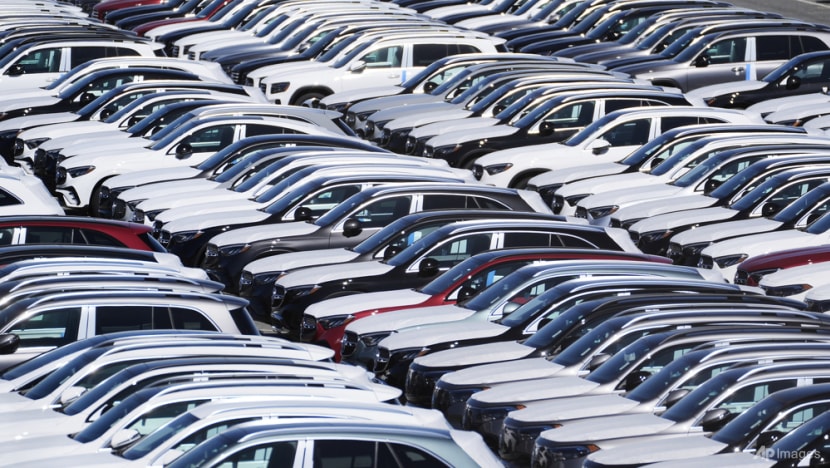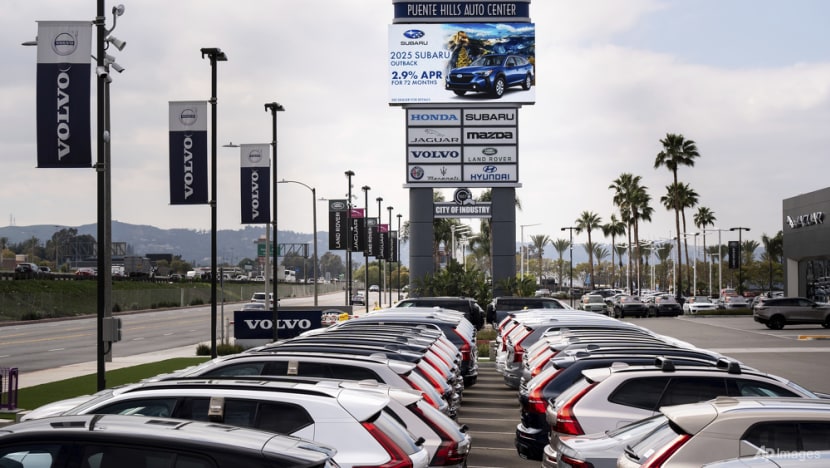US auto tariffs shake global industry as higher prices, job losses loom

Cars are seen at the Mercedes-Benz Vehicle Preparation Center at the Port of Baltimore on Mar 27, 2025. (Photo: AP/Stephanie Scarbrough)
DETROIT: US President Donald Trump's announcement of a 25 per cent tariff on auto imports rippled throughout the world on Thursday (Mar 27), as global carmakers warned of immediate price hikes and dealers raised fears of job losses in big auto-exporting countries, many of which are US allies.
The new levies are a precursor to another expected round of wide-ranging US tariffs to be levied next week.
But the auto tariffs alone could add thousands of dollars to the average cost of a vehicle in the US and further dampen demand at a time when the sector is already struggling to manage the transition to electric cars.
Most auto stocks tumbled on Thursday, with US electric-vehicle maker Tesla a noted exception.
"The entire automotive industry, global supply chains and companies as well as customers will have to bear the negative consequences," said Germany's Volkswagen in a statement.
The United States is the world's largest importer of cars, most from Japan, South Korea and Germany, along with vehicles from neighbors Canada and Mexico.
Nearly half of all cars sold in the US last year were imported, according to research firm GlobalData.
Shares of General Motors were down nearly 7 per cent on Thursday afternoon, while Ford Motor and US-listed shares of Stellantis were down about 3 per cent. Tesla's stock rose about 5 per cent, as Elon Musk's company is less exposed to tariffs than its competitors.
"There are no 'winners' in the absolute - only relative winners, with a significant amount of cost set to be introduced into the industry," Barclays analysts said in a note, calling Trump's tariffs a "more draconian outcome than most anticipated".
Proponents of Trump's efforts, including the US United Auto Workers, say the United States should be focused on boosting domestic production, although the process of moving facilities would likely take years, during which costs will rise and production could drop.
The American Automotive Policy Council, which represents the Detroit Three automakers, said late on Wednesday that "US automakers are committed to President Trump’s vision of increasing automotive production and jobs in the US and will continue to work with the administration on durable policies that help Americans".
The AAPC added that it is critical that the tariffs are implemented in a way that avoids price hikes for consumers.
It may take some time before dealers and consumers see major shortages. Dealers had an average of 89 days of supply on their lots in early March, according to Cox Automotive data. Some consumers have been trying to secure purchases before prices start to rise.
TURMOIL FOR GLOBAL AUTO COMPANIES
Europe's auto industry called for a transatlantic deal to avert the tariffs. Volkswagen, BMW, Mercedes-Benz, Porsche and Continental lost €5.5 billion (US$5.93 billion) in combined market value on Thursday.
Carmakers must now decide whether to localise more production in the US, swallow the costs of tariffs, or pass them to consumers.
Some, including Volvo Cars, Volkswagen's Audi, Mercedes-Benz and Hyundai, have already said they will move some production.
Ferrari, which makes all of its cars in Italy, said it would raise prices to 10 per cent on some models. French car parts supplier Valeo said it would have no choice but to hike prices.
Germany's BLG Group, the port logistics provider for one of the world's busiest auto shipping terminals in Bremerhaven, said it was planning for a 15 per cent reduction in traffic as a result of the tariffs, which will take effect on cars from Apr 3 and auto parts from May 3.

HITS TO US PRODUCTION
Automakers in North America have enjoyed free trade status since the 1994 North American Free Trade Agreement, which encouraged the development of a highly integrated auto supply chain between the US, Canada and Mexico.
Trump's revised 2020 US-Mexico-Canada Agreement imposed new rules to spur regional content production.
The tariffs will have an effect on production almost immediately, Cox Automotive said. It expects disruption to "virtually all" North American vehicle output by mid-April, cutting output by roughly 20,000 cars a day, or about 30 per cent of production.
The White House said Trump's tariffs would "protect and strengthen the US automotive sector" more than previous trade deals.
After clamping tariffs of 25 per cent on Mexico and Canada in early March, Trump allowed a one-month reprieve for vehicles produced in compliance with the terms of the USMCA, but the new rules do not extend that.
Importers of cars made in the North American region will get the chance to certify their US content to avoid taxes on those components of the vehicle, the White House said.
Some CEOs have privately expressed reluctance to make long-term business decisions based on what could be a short-term policy, saying a market selloff could cause Trump to change his mind.
"We know that the president regards the Dow Jones index as a key barometer of his success," analysts at Bernstein Research said.
"It is hard to judge the duration of such chainsaw-like policies if these cause a market slump that does not appear to be transitory."
















